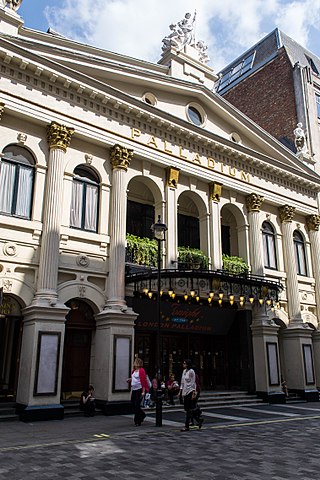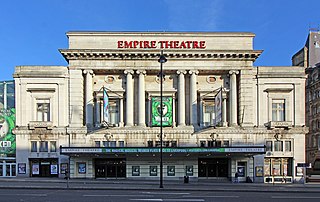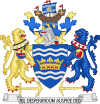
Music hall is a type of British theatrical entertainment that was popular from the early Victorian era, beginning around 1850. It faded away after 1918 as the halls rebranded their entertainment as variety. Perceptions of a distinction in Britain between bold and scandalous Music Hall and subsequent, more respectable Variety differ. Music hall involved a mixture of popular songs, comedy, speciality acts, and variety entertainment. The term is derived from a type of theatre or venue in which such entertainment took place. In North America vaudeville was in some ways analogous to British music hall, featuring rousing songs and comic acts.

The London Palladium is a Grade II* West End theatre located on Argyll Street, London, in the famous area of Soho. The theatre holds 2,286 seats. Of the roster of stars who have played there, many have televised performances. Between 1955 and 1969 Sunday Night at the London Palladium was held at the venue, which was produced for the ITV network. The show included a performance by The Beatles on 13 October 1963. One national paper's headlines in the following days coined the term "Beatlemania" to describe the increasingly hysterical interest in the band.

The City of Sunderland is a metropolitan borough with city status in the metropolitan county of Tyne and Wear, North East England. It is named after its largest settlement, Sunderland, spanning a far larger area, including nearby towns including Washington, Hetton-le-Hole and Houghton-le-Spring, as well as the surrounding suburban villages. The district also forms a large majority of Wearside which includes Chester-le-Street in County Durham.

The Liverpool Empire Theatre is a theatre on the corner of Lime Street in Liverpool, England. The playhouse, which opened in 1925, is the second one to be built on the site. It has the largest two-tier auditorium in the United Kingdom and can seat 2,348 people.

The Palace Theatre, Manchester, is one of the main theatres in Manchester, England. It is situated on Oxford Street, on the north-east corner of the intersection with Whitworth Street. The Palace and its sister theatre the Opera House on Quay Street are operated by the same parent company, Ambassador Theatre Group. The original capacity of 3,675 has been reduced to its current 1,955.

The Bristol Hippodrome is a theatre located in The Centre, Bristol, England, United Kingdom with seating on three levels giving a capacity of 1,951. It frequently features shows from London's West End when they tour the UK, as well as regular visits by Welsh National Opera and an annual pantomime.

Matilda Alice Powles, Lady de Frece was an English music hall performer. She adopted the stage name Vesta Tilley and became one of the best-known male impersonators of her era. Her career lasted from 1869 until 1920. Starting in provincial theatres with her father as manager, she performed her first season in London in 1874. She typically performed as a dandy or fop, also playing other roles. She found additional success as a principal boy in pantomime.

The New Wimbledon Theatre is situated on the Broadway, Wimbledon, London, in the London Borough of Merton. It is a Grade II listed Edwardian theatre built by the theatre lover and entrepreneur, J. B. Mulholland. Built on the site of a large house with spacious grounds, the theatre was designed by Cecil Aubrey Massey and Roy Young. It seems to have been the only British theatre to have included a Victorian-style Turkish bath in the basement. The theatre opened on 26 December 1910 with the pantomime Jack and Jill.

Mayflower Theatre is a Grade II listed theatre in the city centre of Southampton, England, with a capacity of 2,300. It features West End theatre shows when they tour the United Kingdom. In addition to this, one-off comedy shows and music events often take place at the theatre too.

The Regent Theatre is a theatre in Stoke-on-Trent, England. Constructed in 1929 as a cinema, it is one of several theatres in the city centre and one of two operated by the Ambassador Theatre Group on behalf of Stoke-on-Trent City Council. The building was converted for full-time use as a theatre in 1999, and since then has hosted a number of shows and musicals. The theatre is also the northern base for the Glyndebourne Touring Opera.

The Alhambra Theatre is a theatre in Bradford, West Yorkshire, England, named after the Alhambra palace in Granada, Spain, which was the place of residence of the Emir of the Emirate of Granada. It was built in 1913 at a cost of £20,000 for theatre impresario Francis Laidler, and opened on Wednesday 18 March 1914. In 1964, Bradford City Council bought the Alhambra for £78,900 and in 1974, it was designated a Grade II listed building. It underwent extensive refurbishment in 1986. Today it is a receiving house for large-scale touring theatre of all types and the main house seats 1,456.

Chitty Chitty Bang Bang is a musical with music and lyrics written by Richard and Robert Sherman and a book by Jeremy Sams. It is sometimes referred to as Chitty the Musical to distinguish it from the 1968 film of the same name on which it is based, written by Roald Dahl, Ken Hughes, and Richard Maibaum. The 1968 film was based in turn on the book of the same name by Ian Fleming. The show premiered at the London Palladium on April 16, 2002, directed by Adrian Noble before opening on Broadway in 2005.
Jon Robyns is a British stage actor, who is best known for playing the roles of Princeton and Rod in Avenue Q the musical and Jean Valjean in Les Misérables in London's West End.
JoAnn Gibb is a Scottish theatre actress best known for her role of Rumpleteazer in the 1998 film of Andrew Lloyd Webber's Cats, and as the replacement Pearl the Observation Car in the original production of Starlight Express. She also played Belle in the 2006 UK Productions tour of Beauty and the Beast and appeared as Columbia in the 2000 UK national tour of The Rocky Horror Show.

Bridlington Spa is a dance hall, theatre and conference centre in Bridlington, East Riding of Yorkshire, England. Refurbished between 2006 and 2008 and further updated with a new branding in 2016, the venue boasts a large Art Deco ball room, Edwardian theatre, art gallery and a selection of other meeting and event spaces; all featuring outstanding views over Bridlington's South Bay.

The Syndicate was a superclub and music venue in Blackpool, Lancashire, England. It was the largest nightclub in North West England, and claimed to be the largest nightclub in the United Kingdom. The club opened in December 2002 and had at the time of closing, three levels of floor space, three segmented rooms, and a VIP floor. It had a capacity of 5,000 if including the club 'status', which was part of the building but was advertised as a second nightclub in the earlier years. Otherwise, the capacity was 4,500, with a 2,200 capacity in the downstairs section, and a 2,300 capacity in the higher levels. The higher floors were tiered, with the VIP section being at the top of the tier overlooking a balcony section below which itself overlooked the dancefloor. The dance floor area had a revolving dance floor in the middle of it. This whole upper section of floors was a single open space and was named the 'Dance Arena'.

Brighton Hippodrome is an entertainment venue in the ancient centre of Brighton, part of the English city of Brighton and Hove. It has been empty and out of use since 2007, when its use as a bingo hall ceased.
Ben Harrison is a British sound designer specialising in musical theatre and live events.

The Swan Theatre is a theatre currently run by the Worcester Theatres Charitable Trust in Worcester, England. It is the official residence of the Worcester Repertory Company, Swan Youth Theatre and Young Rep. It stages drama, music, dance and spoken word as well as being hired out to local, regional and national amateur groups. It was built in 1965 and was designed by Henry Gorst. The Swan Theatre was built a decade after the demolition of the Worcester Theatre Royal, which was condemned due to fire damage.

The Chiswick Empire was a theatre facing Turnham Green in Chiswick that opened in 1912 and closed and was demolished in 1959. A venue for touring artists, some of the greatest names in drama, variety and music hall performed there including George Formby, Laurel and Hardy, Chico Marx, Peter Sellers and Liberace.



















